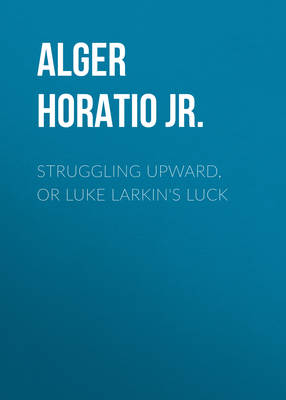Kitabı oku: «Rufus and Rose; Or, The Fortunes of Rough and Ready», sayfa 7
CHAPTER XIV.
HOW RUFUS SUCCEEDED IN BUSINESS
Very little has been said of Rufus in his business relations. When he entered Mr. Turner's office, he resolved to spare no pains to make himself useful, and his services satisfactory to his employer. He knew very well that he owed his situation entirely to the service which he had accidentally been able to do Mr. Turner, and that, otherwise, the latter would never have thought of selecting an office-boy from the class to which he belonged. But Rufus was resolved that, whatever might have been his original motive, he should never regret the selection he had made. Therefore he exerted himself, more than under ordinary circumstances he would have done, to do his duty faithfully. He tried to learn all he could of the business, and therefore listened attentively to all that was going on, and in his leisure moments studied up the stock quotations, so that he was able generally to give the latest quotations of prices of the prominent stocks in the market.
Mr. Turner, who was an observant man, watched him quietly, and was pleased with his evident pains to master the details of the business.
"If Rufus keeps on, Mr. Marston," he said to his chief clerk, one day, "he will make an excellent business-man in time."
"He will, indeed," said the clerk. "He is always prompt, and doesn't need to be told the same thing twice. Besides, he has picked up a good deal of outside information. He corrected me yesterday on a stock quotation."
"He did me a great service at one time, and I mean to push him as fast as he will bear it. I have a great mind to increase his pay to ten dollars a week at once. He has a little sister to take care of, and ten dollars a week won't go far in these times."
"Plenty of boys can be got for less, of course; but he is one in a hundred. It is better to pay him ten dollars than most boys five."
In accordance with this resolution, when Rufus, who had gone to the bank, returned, Mr. Turner called him. Rufus supposed it was to receive some new order, and was surprised when, instead, his employer inquired:—
"How is your little sister, Rufus?"
"Very well, thank you, sir."
"Have you a comfortable boarding-place?"
"Yes, sir."
"How much board do you pay?"
"Eight dollars a week for both of us, sir."
"That takes up the whole of your salary,—doesn't it?"
"Yes, sir; but I have invested the money I had in a stationery store on Sixth Avenue, and get a third of the profits. With that I buy clothes for myself and sister, and pay any other expenses we may have."
"I see you are a great financier, Rufus. I was not aware that you had a business outside of mine. How long have you been with me?"
"About four months, sir."
"Your services have been quite satisfactory. I took you into the office for other reasons; but I feel satisfied, by what I have noticed of you, that it will be well worth my while to retain your services."
"Thank you, sir," said Rufus.
He was exceedingly gratified at this testimony, as he had reason to be, for he had already learned that Mr. Turner was an excellent business-man, and bore a high reputation in business circles for probity and capacity.
"I intended, at the end of six months," pursued Mr. Turner, "to raise your pay to ten dollars a week if you suited me; but I may as well anticipate two months. Mr. Marston, you will hereafter pay Rufus ten dollars a week."
"Very well, sir."
"I am very much obliged to you, Mr. Turner," said Rufus, gratefully. "I didn't expect to have my pay raised for a good while, for I knew that I received more already than most office-boys. I have tried to do my duty, and shall continue to do so."
"That is the right way, Rufus," said his employer, kindly. "It will be sure to win success. You are working not only for me, but most of all for yourself. You are laying now the foundation of future prosperity. When an opportunity occurs, I shall promote you from the post of errand-boy to a clerkship, as I judge from what I have seen that you will be quite competent to fill such a position."
This intelligence was of course very gratifying to Rufus. He knew that as yet he was on the lowest round of the ladder, and he had a commendable desire to push his way up. He saw that Mr. Turner was well disposed to help him, and he resolved that he would deserve promotion.
When he returned home to supper, he carried to Miss Manning and Rose the tidings of his increase of pay, and the encouraging words which had been spoken by Mr. Turner.
"I am not surprised to hear it, Rufus," said Miss Manning. "I felt sure you would try to do your duty, and I knew you had the ability to succeed."
"Thank you for your good opinion of me," said Rufus.
"I can tell you of some one else who has a good opinion of you," said Miss Manning.
"Who is it?"
"Mrs. Clifton. She said this forenoon, that she considered you one of the most agreeable and wittiest young men she was acquainted with."
"I suppose I ought to blush," said Rufus; "but blushing isn't in my line. I hope Mr. Clifton won't hear of it. He might be jealous."
"He doesn't seem much inclined that way," said Miss Manning.
At this moment Mrs. Clifton herself entered.
"Good-evening, Mr. Rushton," she said. "Where do you think I called this afternoon?"
"I couldn't guess."
"At your store in Sixth Avenue."
"I hope you bought something. I expect my friends to patronize me."
"Yes. I bought a package of envelopes. I told Mr. Black I was a friend of yours, so he let me have it at the wholesale price."
"Then I'm afraid I didn't make anything on that sale. When I want some dry goods may I tell your husband that I am a friend of yours, and ask him to let me have it at the wholesale price?"
"Certainly."
"Then I shall take an early opportunity to buy a spool of cotton."
"Can you sew?"
"I never took in any fine work to do, but if you've got any handkerchiefs to hem, I'll do it on reasonable terms."
"How witty you are, Mr. Rushton!"
"I am glad you think so, Mrs. Clifton. I never found anybody else who could appreciate me."
Several days had passed since the accidental encounter with Martin outside of the Academy of Music. Rufus began to hope that he had gone out of the city, though he hardly expected it. Such men as Martin prefer to live from hand to mouth in a great city, rather than go to the country, where they would have less difficulty in earning an honest living. At any rate he had successfully baffled Martin's attempts to learn where Rose and he were boarding. But he knew his step-father too well to believe that he had got rid of him permanently. He had no doubt he would turn up sooner or later, and probably give him additional trouble.
He turned up sooner than Rufus expected.
The next morning, when on the way from the bank with a tin box containing money and securities, he suddenly came upon Martin standing in front of the general post office, with a cigar in his mouth. The respectable appearance which Martin presented in his new clothes filled Rufus with wonder, and he could not avoid staring at his step-father with surprise.
"Hillo!" said Martin, his eye lighting up with malicious pleasure. "So you didn't know me, eh?"
"No," said Rufus.
"I'm in business now."
"I'm glad to hear it," said Rufus.
"I get a hundred dollars a month."
"I'm glad you are prosperous, Mr. Martin."
"Maybe you'll be more willing to own the relationship now."
"I'm glad for your sake only," said Rufus. "I can take care of Rose well enough alone. But I must be going."
"All right! I'll go along with you."
"I am in a hurry," said Rufus, uneasily.
"I can walk as fast as you," said Martin, maliciously. "Seein' you're my step-son, I'd like to know what sort of a place you've got."
The street being free to all, Rufus could not shake off his unwelcome companion, nor could he evade him, as it was necessary for him to go back to the office at once. He consoled himself, however, by the reflection that at any rate Martin wouldn't find out his boarding-place, of which he was chiefly afraid, as it might affect the safety of Rose.
"What have you got in that box?" asked Martin.
"I don't care to tell," said Rufus.
"I know well enough. It's money and bonds. You're in a broker's office, aint you?"
"I can't stop to answer questions," said Rufus, coldly. "I'm in a hurry."
"I'll find out in spite of you," said Martin. "You can't dodge me as easy as last time. I aint so poor as I was. Do you see that?"
As he spoke he drew out a roll of bills (they were counterfeit, but Rufus, of course, was not aware of that), and displayed them.
Our hero was certainly astonished at this display of wealth on the part of his step-father, and was puzzled to understand how in the brief interval since he last saw him he could have become so favored by fortune, but his conjectures were interrupted by his arrival at the office.
"Turner!" repeated Martin to himself, observing the sign. "So this is where my dootiful step-son is employed. Well, I'm glad to know it. It'll come handy some day."
So saying, he lighted a fresh cigar, and sauntered away with the air of a man of independent means, who had come down to Wall Street to look after his investments.
CHAPTER XV.
THE TIN BOX
"I met my dootiful son this mornin'," remarked Martin to his employer, at their next interview.
"Did you?" said Smith, carelessly, for he felt little interest in Martin's relations.
"Yes; he's in business in Wall Street."
"How's that?" asked Smith, his attention arrested by this statement.
"He's with Turner, the banker. He was going to the bank, with a tin box under his arm. I'd like to have the money there was in it."
"Did he tell you there was money in it?"
"No; but I'll bet there was enough in it to make a poor man rich."
"Perhaps so," said Smith, thoughtfully.
"How old is your son?" he inquired, after a pause.
"Fifteen or sixteen, I've forgotten which. You see he isn't my own son; I married his mother, who was a widder with two children; that's the way of it."
"I suppose he doesn't live with you."
"No; he's an undootiful boy. He haint no gratitude for all I've done for him. He wouldn't care if I starved in the street."
"That shows a bad disposition," said Smith, who seemed disposed to protract the conversation for some purposes of his own.
"Yes," said Martin, wiping his eyes pathetically with a red handkerchief; "he's an ungrateful young scamp. He's set my little daughter Rose ag'inst me,—she that set everything by me till he made her believe all sorts of lies about me."
"Why don't you come up with him?"
"I don't know how."
"I suppose you would have no objections if I should tell you."
"No," said Martin, hesitating; "that is, if it aint dangerous. If I should give him a lickin' in the street, he'd call the police, and swear I wasn't his father."
"That isn't what I mean. I'll think it over, and tell you by and by. Now we'll talk about business."
It was not until the next day that Smith unfolded to Martin his plan of "coming up with" Rufus. It was of so bold a character that Martin was startled, and at first refused to have any part in it, not from any conscientious scruples,—for Martin's conscience was both tough and elastic,—but solely because he was a coward, and had a wholesome dread of the law. But Smith set before him the advantages which would accrue to him personally, in so attractive a manner, that at length he consented, and the two began at once to concoct arrangements for successfully carrying out the little plan agreed upon.
Not to keep the reader in suspense, it was no less than forcibly depriving Rufus of the tin box, some morning on his way home from the bank. This might bring Rufus into trouble, while Martin and Smith were to share the contents, which, judging from the wealth of Mr. Turner, were likely to be of considerable value.
"There may be enough to make your fortune," suggested Smith.
"If I don't get nabbed."
"Oh, there'll be no danger, if you will manage things as I direct you."
"I'll have all the danger, and you'll share the profits," grumbled Martin.
"Isn't the idea mine?" retorted Smith. "Is it the soldiers who get all the credit for a victory, or doesn't the general who plans the campaign receive his share? Besides, I may have to manage converting the securities into cash. There isn't one chance in a hundred of your getting into trouble if you do as I tell you; but if you do, remember your oath."
With this Martin was forced to be contented. He was only a common rascal, while Smith was one of a higher order, and used him as a tool. In the present instance, despite his assurances, Smith acknowledged to himself that the plan he had proposed was really attended with considerable danger, but this he ingloriously managed that Martin should incur, while he lay back, and was ready to profit by it if it should prove successful.
Meanwhile Rufus was at work as usual, quite unconscious of the danger which menaced him. His encounter with Martin gave him a little uneasiness, for he feared that the latter might renew his attempts to gain possession of Rose. Farther than this he had no fears. He wondered at the sudden improvement in Martin's fortunes, and could not conjecture what business he could have engaged in which would give him a hundred dollars a month. He might have doubted his assertion, but that his unusually respectable appearance, and the roll of bills which he had displayed, seemed to corroborate his statement. He was glad that his step-father was doing well, having no spite against him, provided he would not molest him and Rose.
He decided not to mention to Rose or Miss Manning that he had met Martin, as it might occasion them anxiety. He contented himself by warning them to be careful, as Martin was no doubt still in the city, and very likely prowling round in the hopes of finding out where they lived.
It was towards the close of business hours that Mr. Marston, the head clerk, handed Rufus a tin box, saying, "Rufus, you may carry this round to the Bank of the Commonwealth."
"Yes, sir," said Rufus.
It was one of his daily duties, and he took the box as a matter of course, and started on his errand. When he first entered the office, the feeling that property of value was committed to his charge gave him a feeling of anxious responsibility; but now he had become used to it, and ceased to think of danger. Probably he would have felt less security, had he seen Mr. Martin prowling about on the opposite side of the street, his eyes attentively fixed on the entrance to Mr. Turner's office. When Martin saw Rufus depart on his errand, he threw away the cigar he had in his mouth, and crossed the street. He followed Rufus closely, unobserved by our hero, to whom it did not occur to look back.
"It's a risky business," thought Martin, rather nervously. "I wish I hadn't undertaken it. Ten to one I'll get nabbed."
He was more than half inclined to give up his project; but if he should do so he knew he would get into disgrace with his employers. Besides, the inducements held out to him were not small. He looked covetously at the tin box under the arm of Rufus, and speculated as to the value of the contents. Half of it would perhaps make him a rich man. The stake was worth playing for, and he plucked up courage and determined to proceed.
Circumstances favored his design.
Before going to the bank, Rufus was obliged to carry a message to an office on the second floor of a building on Wall Street.
"This is my opportunity," thought Martin.
He quickened his steps, and as Rufus placed his foot on the lower step of the staircase, he was close upon him. Hearing the step behind him, our hero turned, only in time to receive a violent blow in the face, which caused him to fall forward. He dropped the box as he fell, which was instantly snatched by Mr. Martin, who lost no time in making his escape.
The blow was so violent that Rufus was for the moment stunned. It was only for a moment, however. He quickly recovered himself, and at once realized his position. He knew, also, that it was Martin who had snatched the box, for he had recognized him during the instant of time that preceded the blow.
He sprang to his feet, and dashed into the street, looking eagerly on either side for the thief. But Martin, apprehending immediate pursuit, had slipped into a neighboring door-way, and, making his way upstairs, remained in concealment for ten minutes. Not suspecting this, Rufus hastened to Nassau Street, and ran toward the bank, looking about him eagerly for Martin. The latter, in the mean while, slipped out of the door-way, and hurried by a circuitous course to Fulton Ferry, where Smith had arranged to meet him and relieve him of the tin box.
"Have you got it?" asked Smith, who had been waiting anxiously for over an hour.
"Here it is," said Martin, "and I'm glad to be rid of it. I wouldn't do it again for a thousand dollars."
"I hope you'll get more than that out of it," said Smith, cheerfully. "You've done well. Did you have much trouble?"
"Not much; but I had to work quick. I followed him into a door-way, and then grabbed it. When'll you divide?"
"Come round to the house this evening, and we'll attend to it."
"Honor bright?"
"Of course."
Meanwhile Rufus, in a painful state of excitement, ran this way and that, in the faint hope of setting eyes upon the thief. He knew very well that however innocent he had been in the matter, and however impossible it was for him to foresee and prevent the attack, the loss would subject him to suspicion, and it might be supposed that he had connived at the theft. His good character was at stake, and all his bright prospects were imperilled.
Meeting a policeman, he hurriedly imparted to him the particulars of the theft, and described Martin.
"A tall man with a blue coat and slouched hat," repeated the officer. "I think I saw him turn into Wall Street half an hour ago. Was his nose red?"
"Yes," said Rufus.
"He hasn't come back this way, or I should have seen him. He must have gone the other way, or else dodged into some side street or door-way. I'll go back with you."
The two went back together, but it was too late. Martin was by this time at some distance, hurrying towards Fulton Ferry.
Rufus felt that the matter was too serious for him to manage alone, and with reluctant step went back to the office to communicate his loss. A formidable task was before him, and he tried to prepare himself for it. It would naturally be inferred that he had been careless, if not dishonest, and he knew that his formerly having been a street boy would weigh against him. But, whatever might be the consequences, he knew that it was his duty to report the loss instantly.
CHAPTER XVI.
MR. VANDERPOOL
Rufus entered the office as Mr. Turner was about to leave it.
"You were rather long," he said. "Were you detained?"
"I wish that was all, Mr. Turner," said Rufus, his face a little pale.
"What has happened?" asked the banker, quickly.
"The box was stolen from me as I was going upstairs to the office of Foster & Nevins."
"How did it happen? Tell me quickly."
"I had only gone up two or three steps when I heard a step behind me. Turning to see who it was, I was struck violently in the face, and fell forward. When I recovered, the man had disappeared, and the box was gone."
"Can I depend upon the absolute truth of this statement, Rufus?" asked Mr. Turner, looking in the boy's face searchingly.
"You can, sir," said Rufus, proudly.
"Can you give any idea of the appearance of the man who attacked you?"
"Yes, sir, I saw him for an instant before the blow was given, and recognized him."
"You recognized him!" repeated the banker, in surprise. "Who is he?"
Our hero's face flushed with mortification as he answered, "His name is Martin. He is my step-father. He has only just returned from Blackwell's Island, where he served a term of three months for trying to pick a man's pocket."
"Have you met him often since he was released?" asked Mr. Turner.
"He attempted to follow me home one evening from the Academy of Music, but I dodged him. I didn't want him to know where I boarded, for fear he would carry off my little sister, as he did once before."
"Did he know you were in my employ?"
"Yes, sir; I met him day before yesterday as I was coming home from the post-office, and he followed me to the office. He showed me a roll of bills, and said he was getting a hundred dollars a month."
"Now tell me what you did when you discovered that you had been robbed."
"I searched about for Martin with a policeman, but couldn't find him anywhere. Then I thought I had better come right back to the office, and tell you about it. I hope you don't think I was very much to blame, Mr. Turner."
"Not if your version of the affair is correct, as I think it is. I don't very well see how you could have foreseen or avoided the attack. But there is one thing which in the minds of some might operate to your prejudice."
"What is that, sir?" asked Rufus, anxiously.
"Your relationship to the thief."
"But he is my greatest enemy."
"It might be said that you were in league with him, and arranged to let him have the box after only making a show of resistance."
"I hope you don't think that, sir?" said our hero, anxiously.
"No, I do not."
"Thank you for saying that, sir. Now, may I ask you one favor?"
"Name it."
"I want to get back that box. Will you give me a week to do it in?"
"What is your plan?"
"I would like to take a week out of the office. During that time, I will try to get on the track of Martin. If I find him, I will do my best to get back the box."
Mr. Turner deliberated a moment.
"It may involve you in danger," he said, at length.
"I don't care for the danger," said Rufus, impetuously. "I know that I am partly responsible for the loss of the box, and I want to recover it. Then no one can blame me, or pretend that I had anything to do with stealing it. I should feel a great deal better if you would let me try, sir."
"Do you think there is any chance of your tracing this man, Martin? He may leave the city."
"I don't think he will, sir."
"I am inclined to grant your request, Rufus," said the banker, after a pause. "At the same time, I shall wish you to call with me at the office of police, and give all the information you are possessed of, that they also may be on the lookout for the thief. We had best go at once."
Mr. Turner and Rufus at once repaired to the police office, and lodged such information as they possessed concerning the theft.
"What were the contents of the box?" inquired the officer to whom the communication was made.
"Chiefly railroad and bank stocks."
"Was there any money?"
"Four hundred dollars only."
"Were any of the securities negotiable?"
"There were two government bonds of five hundred dollars each. They were registered, however, in the name of the owner, James Vanderpool, one of our customers. Indeed, the box was his, and was temporarily in our care."
"Then there would be a difficulty about disposing of the bonds."
"Yes."
"We may be able to get at the thief through them. Very probably he may be tempted to offer them for sale at some broker's office."
"It is quite possible."
"We will do our best to ferret out the thief. The chances are good."
"The thief will not be likely to profit much by his theft," said Mr. Turner, when they were again in the street. "The four hundred dollars, to be sure, he can use; but the railway and bank stocks will be valueless to him, and the bonds may bring him into trouble. Still, the loss of the securities is an inconvenience; I shall be glad to recover them. By the way, Mr. Vanderpool ought at once to be apprised of his loss. You may go up there at once. Here is his address."
Mr. Turner wrote upon a card, the name
James Vanderpool,
No. – West Twenty-Seventh Street
and handed it to Rufus.
"After seeing Mr. Vanderpool, you will come to my house this evening, and report what he says. Assure him that we will do our best to recover the box. I shall expect you, during the week which I allow you, to report yourself daily at the office, to inform me of any clue which you may have obtained."
"You may depend upon me, sir," said our hero.
Rufus at once repaired to the address furnished him by Mr. Turner.
Another difficult and disagreeable task lay before him. It is not a very pleasant commission to inform a man of the loss of property, particularly when, as in the present case, the informant feels that the fault of the loss may be laid to his charge. But Rufus accepted the situation manfully, feeling that, however disagreeable, it devolved upon him justly.
He took the University Place cars, and got out at Twenty-Seventh Street. He soon found Mr. Vanderpool's address, and, ringing the bell, was speedily admitted.
"Yes, Mr. Vanderpool is at home," said the servant. "Will you go up to his study?"
Rufus followed the servant up the front staircase, and was ushered into a front room on the second floor. There was a library table in the centre of the apartment, at which was seated a gentleman of about sixty, with iron-gray hair, and features that bore the marks of sickness and invalidism.
Mr. Vanderpool had inherited a large estate, which, by careful management, had increased considerably. He had never been in active business, but, having some literary and scientific tastes, had been content to live on his income, and cultivate the pursuits to which he was most inclined.
"Mr. Vanderpool?" said Rufus, in a tone of inquiry.
"Yes," said that gentleman, looking over his glasses, "that is my name. Do you want to speak to me?"
"I come from Mr. Turner, the banker," said Rufus.
"Ah, yes; Mr. Turner is my man of business. Well, what message do you bring to me from him?"
"I bring bad news, Mr. Vanderpool," said our hero.
"Eh, what?" ejaculated Mr. Vanderpool, nervously.
"A tin box belonging to you was stolen this morning."
"Bless my soul! How did that happen?" exclaimed the rich man, in dismay.
Rufus gave the account, already familiar to the reader, of the attack which had been made upon him.
"Why," said Mr. Vanderpool, "there were fifty thousand dollars' worth of property in that box. That would be a heavy loss."
"There is no danger of losing all that," said Rufus. "The money I suppose will be lost, and perhaps the government bonds may be disposed of; but that will only amount to about fifteen hundred dollars. The thief can't do anything with the stocks and shares."
"Are you sure of that?" asked Mr. Vanderpool, relieved.
"Yes, sir, Mr. Turner told me so. We have given information to the police. Mr. Turner has given me a week to find the thief."
"You are only a boy," said Mr. Vanderpool, curiously. "Do you think you can do any good?"
"Yes, sir; I think so," said Rufus, modestly. "The box was taken from me, and I feel bound to get it back if I can. If I don't succeed, the certificates of stock can be replaced."
"Well, well, it isn't so bad as it might be," said Mr. Vanderpool. "But are you not afraid of hunting up the thief?" he asked, looking at Rufus, attentively.
"No, sir," said Rufus. "I'd just like to get hold of him, that's all."
"You would? Well now, I would rather be excused. I don't think I have much physical courage. How old are you?"
"Sixteen."
"Well, I hope you'll succeed. I would rather not lose fifteen hundred dollars in that way, though it might be a great deal worse."
"I hope you don't blame me very much for having the box stolen from me."
"No, no, you couldn't help it. So the man knocked you down, did he?"
"Yes, sir."
"That must have been unpleasant. Did he hurt you much?"
"Yes, sir, just at first; but I don't feel it now."
"By the way, my young friend," said Mr. Vanderpool, reaching forward to some loose sheets of manuscript upon the desk before him, "did you ever consider the question whether the planets were inhabited?"
"No, sir," said Rufus, staring a little.
"I have given considerable time to the consideration of that question," said Mr. Vanderpool. "If you have time, I will read you a few pages from a work I am writing on the subject."
"I should be happy to hear them, sir," said Rufus, mentally deciding that Mr. Vanderpool was rather a curious person.
The old gentleman cleared his throat, and read a few pages, which it will not be desirable to quote here. Though rather fanciful, they were not wholly without interest, and Rufus listened attentively, though he considered it a little singular that Mr. Vanderpool should have selected him for an auditor. He had the politeness to thank the old gentleman at the close of the reading.
"I am glad you were interested," said Mr. Vanderpool, gratified. "You are a very intelligent boy. I shall be glad to have you call again."
"Thank you, sir; I will call and let you know what progress we make in finding the tin box."
"Oh, yes. I had forgotten; I have no doubt you will do your best. When you call again, I will read you a few more extracts. It seems to me a very important and interesting subject."
"Thank you, sir; I shall be very happy to call."
"He don't seem to think much of his loss," said our hero, considerably relieved. "I was afraid he would find fault with me. Now, Mr. Martin, I must do my best to find you."










